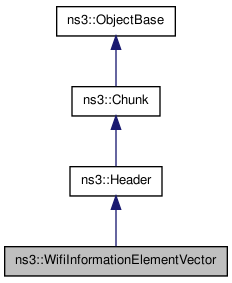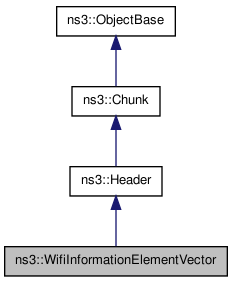Information element vector. More...
#include <wifi-information-element-vector.h>


Public Types | |
|
typedef std::vector< Ptr < WifiInformationElement > >::iterator | Iterator |
| As soon as this is a vector, we define an Iterator. | |
Public Member Functions | |
| virtual uint32_t | DeserializeSingleIe (Buffer::Iterator start) |
| Needed when you try to deserialize a lonely IE inside other header. | |
| void | SetMaxSize (uint16_t size) |
| Set maximum size to control overflow of the max packet length. | |
| Iterator | Begin () |
| Returns Begin of the vector. | |
| Iterator | End () |
| Returns End of the vector. | |
| bool | AddInformationElement (Ptr< WifiInformationElement > element) |
| add an IE, if maxSize has exceeded, returns false | |
| Ptr< WifiInformationElement > | FindFirst (enum WifiElementId id) const |
| vector of pointers to information elements is the body of IeVector | |
Friends | |
| bool | operator== (const WifiInformationElementVector &a, const WifiInformationElementVector &b) |
Inherited from Header | |
|
| |
| TypeId | GetInstanceTypeId () const |
| virtual uint32_t | GetSerializedSize () const |
| virtual void | Serialize (Buffer::Iterator start) const |
| virtual uint32_t | Deserialize (Buffer::Iterator start) |
| virtual void | Print (std::ostream &os) const |
| static TypeId | GetTypeId () |
| This method returns the TypeId associated to ns3::Header. | |
Detailed Description
Information element vector.
Implements a vector of WifiInformationElement's
Member Function Documentation
| virtual uint32_t ns3::WifiInformationElementVector::Deserialize | ( | Buffer::Iterator | start | ) | [virtual] |
- Attention:
- When you use RemoveHeader, WifiInformationElementVector supposes, that all buffer consists of information elements
- Parameters:
-
start
- Returns:
Implements ns3::Header.
| virtual uint32_t ns3::WifiInformationElementVector::DeserializeSingleIe | ( | Buffer::Iterator | start | ) | [virtual] |
Needed when you try to deserialize a lonely IE inside other header.
- Parameters:
-
start is the start of the buffer
- Returns:
- deserialized bytes
| TypeId ns3::WifiInformationElementVector::GetInstanceTypeId | ( | ) | const [virtual] |
- Returns:
- the TypeId associated to the most-derived type of this instance.
This method is typically implemented by ns3::Object::GetInstanceTypeId but some classes which derive from ns3::ObjectBase directly have to implement it themselves.
Implements ns3::ObjectBase.
| virtual uint32_t ns3::WifiInformationElementVector::GetSerializedSize | ( | ) | const [virtual] |
- Returns:
- the expected size of the header.
This method is used by Packet::AddHeader to store a header into the byte buffer of a packet. This method should return the number of bytes which are needed to store the full header data by Serialize.
Implements ns3::Header.
| static TypeId ns3::WifiInformationElementVector::GetTypeId | ( | void | ) | [static] |
This method returns the TypeId associated to ns3::Header.
No Attributes defined for this type.
No TraceSources defined for this type.
Reimplemented from ns3::Header.
| virtual void ns3::WifiInformationElementVector::Print | ( | std::ostream & | os | ) | const [virtual] |
- Parameters:
-
os output stream This method is used by Packet::Print to print the content of a trailer as ascii data to a c++ output stream. Although the trailer is free to format its output as it wishes, it is recommended to follow a few rules to integrate with the packet pretty printer: start with flags, small field values located between a pair of parens. Values should be separated by whitespace. Follow the parens with the important fields, separated by whitespace. i.e.: (field1 val1 field2 val2 field3 val3) field4 val4 field5 val5
Implements ns3::Header.
| virtual void ns3::WifiInformationElementVector::Serialize | ( | Buffer::Iterator | start | ) | const [virtual] |
- Parameters:
-
start an iterator which points to where the header should be written.
This method is used by Packet::AddHeader to store a header into the byte buffer of a packet. The data written is expected to match bit-for-bit the representation of this header in a real network.
Implements ns3::Header.
The documentation for this class was generated from the following file:
- src/devices/mesh/wifi-information-element-vector.h
 1.7.1
1.7.1